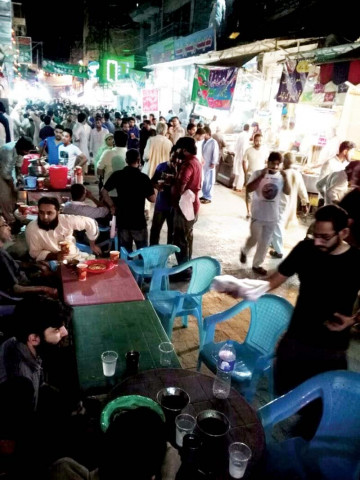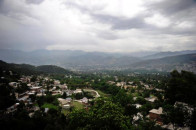Kartarpura Bazar bustles in Ramazan
Residents say nights shine like days despite high prices of paye, nihari

Kartarpura Bazar—the 100-year-old food street at the centre of the city—is bustling and booming with
business as the holy month is inching towards its end.
The food street has been the central dining destination for local fried food for over a century but in Ramazan its splendor reaches its peak.
Several spicy dishes are served here including goat trotters (sri paye), mutton roast and broth meat, mutton tikka, beef tikka, nihari, nali paye, bong nihari, maghaz nihari, pathura, qatlame, gram with broth, dried roasted gram, malai boti, butter chicken handi, makhni desi chicken, kofta channe, saag, desi ghee paratha, makai roti, salted and sweet lassi, juices, qeema mattar, butter and sesame naan, and countless others.
There are three historic restaurants that sell sehri food wearing old Mughal-style costumes, including kula, big hats and jubba, are a fun sight and take one back to the century-old culture.
A shopkeeper Muhammad Iqbal, who sells nihari and sri paya, said his family has been selling food here for the last 45 years. Now the shop has been transferred to their third generation, he added.
The price rates here are also very high. Plain nihari costs Rs300 per plate, with nalli and maghaz the price goes up to Rs400-500, bong sri paya costs Rs350, plain sri paya costs Rs250, makhni chicken handi costs Rs1300, pathura costs Rs50 per piece, sesame naan costs Rs30, malai boti costs Rs200, lassi glass costs Rs150, gram with broth costs Rs150, garam kofta costs Rs200 whereas paratha is sold for Rs35 each.
An old-fashioned vendor Muhammad Kala said his family has been running the food business since 1970. He said,” Nihari is our identity. Our customers also come from other cities. In Ramazan, the rate is increased by Rs100. We sell nihari only on booking.”
The hustle and bustle of the street begin around 10 pm. Residents of the suburbs and Islamabad usually purchase sehri before midnight. This food bazaar is also very busy during iftaar time with record sales of fritters, samosas, kachori, dates and lassi.
Since the bazaar is bustling with food lovers, sehri shopping starts at midnight. After 2am customers are usually unable to get nihari and sri paya of their choice. For a standard nihari meal from old shops, one has to get a token first.
A pathura seller, Nasir Jamal, said that he hailed from Gujranwala but has been selling pathura since 2000. Apart from the locals of Rawalpindi, a large number of people from Lahore, Gujranwala, Sialkot and Faisalabad also work at the bazaar.
Citizen Faheem Akhtar said that if Ramazan comes and one doesn’t go for sehri at Kartarpura, then it feels Ramazan hasn’t been completed. “From the first day of Ramazan to the day of Eidul Fitr, all the sehri brought to our house is from Kartarpura.”
Another citizen, Fayyaz Ahmed, said that time flies in Kartarpura Sehri Bazaar. In the dead of night, the bazaar offers a view of the day. “I have tried paye from almost all the shops and the bazaar and every cook has a different recipe of paye and nihari that one cannot afford to avoid.”
Published in The Express Tribune, April 25th, 2022.



















COMMENTS
Comments are moderated and generally will be posted if they are on-topic and not abusive.
For more information, please see our Comments FAQ